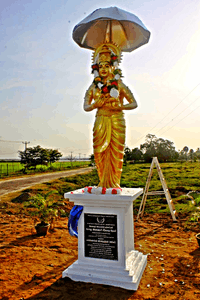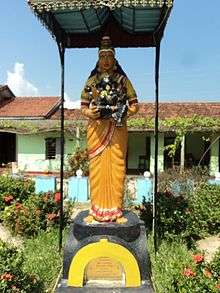Seerpadar
Seerpadar (also written as Cirpatar or Seerpadam) is a Tamil caste found in the coastal regions of Eastern Province in Sri Lanka.[1] They are traditionally involved in agriculture.[2] They are chiefly found in the Veeramunai, Mandur, Thuraineelavanai, Kalmunai, Kurumanveli and Periye Kallar regions in the Batticaloa and Ampara District.[1][3]
| Seerpadar | |
|---|---|
 Chola princess Seerpada Devi | |
| Religions | Shaivism |
| Languages | Tamil |
History
Early History

The Seerpadar caste derive their name and origin from a Chola queen known as Seerpada Devi, chronicled in inscriptions, copper plates and local poems.[4] According to them, their origin stems from the union of Seerpada Devi and the prince Sittathurai (also known as Balasimhan), the son of king Ukkirasinghan (legendary founder of Jaffna Kingdom).[1] The caste has been recorded in colonial records as being involved in cultivating activities such as farming.[2][4]
Seerpadar's Inscriptions
- Veeramunai ceppedu
- Thirukkovil ceppedu
- Kokkaticholai ceppedu
- Thuraineelavanai ceppedu
- Thirukonamalai ceppedu
Others
References
- Raghavan, M. D. (1971). Tamil culture in Ceylon: a general introduction. Kalai Nilayam. pp. 109–112.
- McGilvray, Dennis B. (7 May 2008). Crucible of Conflict: Tamil and Muslim Society on the East Coast of Sri Lanka. Duke University Press. pp. 41, 376. ISBN 978-0-8223-4161-1.
- Whitaker, Mark P. (2007). Learning politics from Sivaram: the life and death of a revolutionary Tamil journalist in Sri Lanka. Pluto Press. p. 67. ISBN 978-0-7453-2353-4.
- Whitaker, Mark P. (1 January 1999). Amiable Incoherence: Manipulating Histories and Modernities in a Batticaloa Tamil Hindu Temple. V.U. University Press. pp. 117, 127. ISBN 978-90-5383-644-6.